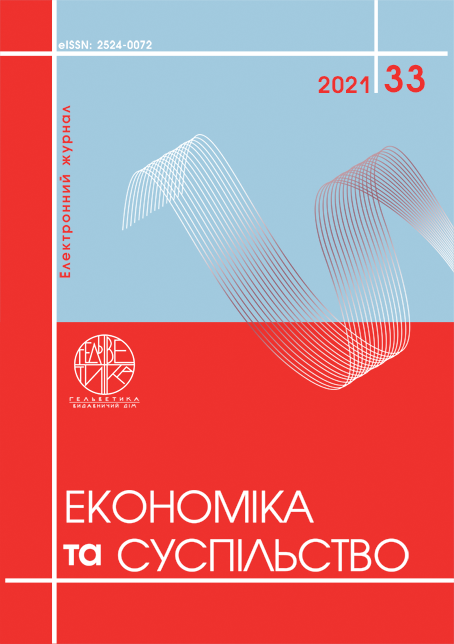CONCEPTUAL PRINCIPLES OF INCLUSIVENESS IN THE FIELD OF INDUSTRIAL ACTIVITY IN UKRAINE
Abstract
The article states that when studying the factors influencing inclusive economic development, considerable attention should be paid to determining which types of economic and political institutions can be attributed to the country (complex or mining), which, in turn, affects the country's development. However, the characteristics of the political system and the economic system are the same because they are closely linked. Attention should be paid to the characteristics of the political system (government efficiency, degree of corruption, etc.), relative stability of quality indicators and reproducibility in dynamics. The presence of strong inclusive institutions, by definition, leads to faster economic development in the long run, while the exploiting institutions of the economy cannot achieve long-term development, which occurs only in the short term and ceases to exist. One of the areas of analysis is the study of improving economic and political institutions through the introduction of more efficient production organizations, education, urbanization and accumulation of human and social capital, which economically allows the success of modernization projects. Developed countries. In this context, it should be noted that institutional reforms are more likely to fail due to the formation of a privileged class that receives significant rents in transition countries. One of the possible ways to determine the propensity of the economy to inclusive or extractive development, and hence the quality or weakness of institutions, is the analysis of statistical data on the priority specialties for which higher education is obtained. Increasing inequality, continuous technological improvement and the complexity of production have other negative and tangible social consequences. As technology advances and life expectancy declines, the reassessment of life expectancy and human values is at the forefront of education, employment, and job search, while traditional family values such as family creation, childbirth, and parenthood have been pushed aside. The direct consequence of this is the decline in the birth rate and the corresponding demographic problems in developed countries related to the "aging" of the population and the need to attract and adapt to immigrants of different cultures and ways of thinking. Another aspect of the impact of technology on society is that all members quickly adapt to dynamic technological change and "catch up" with technology (lifelong learning, retraining, professions and occupations, place of residence, social status, etc.).
References
Кожина А. В. Інклюзивний місцевий розвиток: сутність, проблематика та теоретико-концептуальні засади. Strategic Management: Global Trends and National Peculiarities. Multi-authored monograph. State University of Jan Kochanowski, Poland: Publishing House “Baltija Publishing”, 2019. Pp. 335–350.
Сіденко В. Р. Структурні трансформації у світовій економіці: виклики для України : аналітична доповідь. Київ : Заповіт, 2017. 182 с.
Залознова Ю. Економічні та соціальні проблеми розвитку промисловості : монографія. Київ : Ін-т екон. промисловості НАН України, 2017. 288 с.
Кіндзерський Ю. Деіндустріалізація та її детермінанти у світі та в Україні. Економіка України. 2017. № 11. С. 48–72.
Харазішвілі Ю.М. Тіньова економіка України як резерв її модернізації : матеріали Міжвідомчої науково-практичної конференції «Тіньова економіка України як резерв її модернізації». URL: http://iep.com.ua/publ/zakhodi/konferenciji/mizhvidomcha_naukovo_praktichna_konferencija_tinova_ekonomika_svitovi_tendenciji_ta_ukrajinski_realiji/19-1-0-55
Приварнікова І., Степанюк К. Тіньова економіка: причини, обсяги та шляхи їх зменшення. URL: http://www.nbuv.gov.ua/portal/soc_gum/dtr/ep/2010_2
Базилюк А.В., Жулин О.В. Інклюзивне зростання як основа економічного розвитку. Економіка та управління на транспорті. 2015. Вип. 1. С. 19–29. URL: http://nbuv.gov.ua/UJRN/eut_2015_1_5
Бобух І.М., Щегель С.М. Стратегічні орієнтири економічного зростання України: інклюзивність як ключовий пріоритет. Вісник Національної академії наук України. 2018. № 7. С. 55–70.
Kozhyna A.V. (2019) Inkliuzyvnyi mistsevyi rozvytok: sutnist, problematyka ta teoretyko-kontseptualni zasady [Inclusive local development: essence, issues and theoretical and conceptual principles]. Strategic Management: Global Trends and National Peculiarities. Multi-authored monograph. State University of Jan Kochanowski, Poland: Publishing House “Baltija Publishing”, Pp. 335–350. (in Ukrainian)
Sidenko V.R. (2017) Strukturni transformatsii u svitovii ekonomitsi: vyklyky dlia Ukrainy : analitychna dopovid. [Structural Transformations in the World Economy: Challenges for Ukraine: An Analytical Report]. Kyiv: Zapovit. (in Ukrainian)
Zaloznova Yu. (2017) Ekonomichni ta sotsialni problemy rozvytku promyslovosti [Economic and social problems of industrial development]. Kyiv: Instytut ekonomiky promyslovosti NAN Ukrainy. (in Ukrainian)
Kindzerskyi Yu. (2017) Deindustrializatsiia ta yii determinanty u sviti ta v Ukraini [Deindustrialization and its determinants in the world and in Ukraine]. Ekonomika Ukrainy, 11, 48–72. (in Ukrainian)
Kharazishvili Yu.M. (2019) Tinova ekonomika Ukrainy yak rezerv yii modernizatsii [Ukraine's shadow economy as a reserve for its modernization]. materialy Mizhvidomchoi naukovo-praktychnoi konferentsii «Tinova ekonomika Ukrainy yak rezerv yii modernizatsii». Retrieved from: http://iep.com.ua/publ/zakhodi/konferenciji/mizhvidomcha_naukovo_praktichna_konferencija_tinova_ekonomika_svitovi_tendenciji_ta_ukrajinski_realiji/19-1-0-55 (in Ukrainian)
Pryvarnikova I., Stepaniuk K. (2010) Tinova ekonomika: prychyny, obsiahy ta shliakhy yikh zmenshennia [Shadow economy: causes, volumes and ways to reduce them]. Retrieved from: http://www.nbuv.gov.ua/portal/soc_gum/dtr/ep/2010_2 (in Ukrainian)
Bazyliuk A.V., Zhulyn O.V. (2015) Inkliuzyvne zrostannia yak osnova ekonomichnoho rozvytku [Inclusive growth as a basis for economic development]. Ekonomika ta upravlinnia na transporti, 1, 19–29. Retrieved from: http://nbuv.gov.ua/UJRN/eut_2015_1_5. (in Ukrainian)
Bobukh I.M., Shchehel S.M. (2018) Stratehichni oriientyry ekonomichnoho zrostannia Ukrainy: inkliuzyvnist yak kliuchovyi priorytet [Strategic guidelines for Ukraine's economic growth: inclusiveness as a key priority]. Visnyk Natsionalnoi akademii nauk Ukrainy, 7, 55–70. (in Ukrainian)


